- Home
- Amin Maalouf
The Disoriented Page 11
The Disoriented Read online
Page 11
The responses from the students were not particularly interesting; one of the ones I remember suggested that future generations would be outraged to discover that, in our time, millions of animals were slaughtered in abattoirs and that most people found this perfectly normal—to my mind, a rather optimistic view of the future of our species …
The fact remains that my approach appealed to some of the directors of the institute. It even became an obligatory part of interviews when recruiting researchers. “Tell me, Kim, I’m sure that, right under my nose, there is some fundamental point about the future of Asia—or Europe, or oil, or nuclear power—that I simply cannot see. Could you tell me what it is?” It is impossible to respond there and then, you have to rack your brains, to project yourself beyond what we are capable of seeing at first glance. Hence the expression “digging tool” …
So this is how I’ve been entertaining myself for the past few years while everyone else thinks I’m working!
What about you, what are you up to? You didn’t tell me very much about your life, your work, your plans … Which means you now have to write me another letter.
Yours faithfully,
Albert
Since then, we’ve never lost touch. Back in the days of stamped envelopes, we wrote to each other at least once a year, then, with the advent of email, the frequency increased considerably. These days, it’s rare for several weeks to pass without us exchanging messages. Sometimes they are brief, an article one of us has read and wants to share with the other. Accompanied by a word—yes, a single word, fascinating, or worrying, or simply regards; and signed with a single letter—A—our common initial.
I have kept a paper record of our correspondence; systematically in the case of the letters I received, less rigorously in the case of letters I sent since I didn’t always make a photocopy. Keeping a back-up of emails has been more hit-and-miss. In theory, emails are saved systematically; in practice, every time one of my laptops has given up the ghost, and every time I’ve had to change my email address, various documents have mysteriously disappeared.
But I don’t worry about that. Am I not forced, as a historian of antiquity, to work from fragments and traces? By comparison, I have an abundance of materials at my disposal for reconstructing my own past, both my personal memories and the documents I have preserved. My dilemma is elsewhere—in the mental failing that separates my private world from my public writing, as though the former could not but discredit the latter.
-
2
Having dutifully copied long extracts from his old friend’s email into his notebook, Adam went over and lay down on the bed and once more dipped into the cache of letters from long ago, moving from one envelope to another. Ordinarily, he took great pleasure in reading the letters and was tempted to immerse himself in them and pay no heed to the time. But now a guilty conscience inevitably prevailed. No sooner did he step away from the work he was supposed to be doing than he began to reproach himself.
On this particular day, he tore himself away too quickly, all too quickly, from pleasurable indolence and went back to his computer to begin another letter he had promised he would write on this day of mourning.
My dearest Naïm,
I am writing to relate a piece of sad news: Mourad has just died of cancer. His funeral is today.
I don’t know whether you kept in touch with him. Personally, I had not spoken to him for some years, as I already explained to you; but, last Wednesday, he and his wife phoned to tell me he was dying and that he wanted to see me. I flew out that same evening, but he died during the night before we had a chance to talk.
I think that Tania would love to hear from you. She also wants to organize a reunion of his old friends from university. This, in itself, is an excellent idea, regardless of the circumstances. What do you think? Would you have any suggestions as to the location and the date? I would prefer Paris, but am open to any suggestions.
Yours,
Adam
As with Albert, I made contact again with Naïm by happy accident; for several years our exchanges had been sporadic, then, thanks to email, the flow became steadier.
But in this case, it happened somewhat later, only about ten years ago, and in much the same way, except that it was not I who found him, but he who found me.
I had just published an article about Attila in a minor historical magazine that had devoted an issue to the “Barbarian invasions,” one I did not expect to be read outside of France. So I was agreeably surprised when the editor of the magazine forwarded a letter bearing a Brazilian stamp. The back of the envelope bore only the initials of the sender, and the first lines gave nothing away.
Dear Professor,
I am writing first and foremost to thank you for what I learned from your article on the character of Attila. We assume that we know historical figures, we have two or three snippets of received wisdom, yet we sometimes allow ourselves to use such figures to illustrate our own opinions. Then, suddenly, we read something that makes us realize we know very little about the Hun and his era. Worse still, we discover that what little we knew was so approximate, so nebulous, that we might just as well consider it fallacious.
I was wondering, Professor, whether you have ever considered writing a biography about this figure? As a reader, I would warmly encourage you to do so. If my humble suggestion should meet with your agreement and you do decide to write such a book, I would be grateful if you could send a signed copy to the following address:
Naïm E., […], Avenida Ipiranga, São Paulo, Brazil.
NB: No, it’s not a namesake.
Obviously, I wanted to throw my arms around him, to tell him how happy I was to have found him again, to ask what he had been up to. But I restrained myself. If I was to respect the ethos of our old circle of friends, I had to reply in the same register he had adopted. Whenever one of us engaged in an elaborate charade, the trick was to remain straight-faced as long as possible, to patiently foster a sense of uncertainty, of ambiguity, and certainly not to burst out laughing at the first exchange. According to the rules, the winner was the last one to laugh.
I therefore formulated my response as follows:
Dear reader,
Your letter touched me deeply. Attila is probably one of the most misunderstood figures in history. And whenever I say at a seminar—in a spirit of provocation, I confess—that he is the grandfather of modern Europe, some of my listeners imagine that, with my being from the Levant, I am trying to insult them.
Curious that you should suggest I might write a biography! I suggested the possibility to a Parisian publisher only a week before I received your letter, and he has agreed. I already have all the necessary documentation, my outline is complete, and I should be able to write the book in a matter of months. I will make it my duty to send you a copy as soon as it is published.
An alternative solution would be to come in person and collect it from the following address:
Adam W., […] rue du Cherche-Midi, Paris 75006.
NB: If you should visit, even if the book is not yet published, a meal will be provided, followed by Turkish coffee.
In choosing to renew our friendship in this manner, after a gap of sixteen years, we instantly reestablished a complicity we had shared back when we were at university, before the last four or five local wars, before our accursed dispersion.
Later, we rarely wrote letters to each other. When we exchanged addresses, we also exchanged phone numbers and we would call each other occasionally. The telephone is insidious, and deceptive. It creates a false sense of proximity; it favours immediacy and superficiality; and, what is most damning for a historian like me, it leaves no paper trail.
Happily, over the past three years, Naïm and I have begun emailing. Ever since, as with Albert, we have written to each other regularly.
Once or twice he has asked how my bio
graphy of Attila is coming along. I have had to tell him that it is still at the same stage—a work in progress, which means work is at a standstill.
Was it a bad idea from the first? I don’t think so. When I wrote the article Naïm referred to, I genuinely felt that I had the book at my fingertips. I felt able to recount the life of Attila from birth to death without even consulting my notes. I knew the names of his wives and the career paths of his counsellors. I shouldn’t phrase it in the past tense, I haven’t forgotten any of that. But the shift from a short text to a long one proved complicated.
An article requires only a few compelling ideas; a biography requires a writer to be exhaustive, to not lay himself open to criticism by specialists. For example, in an article or at a conference, it sounds impressive when I point out that Attila’s principal adversary, the Roman military commander Flavius Aetius, was not a stranger to him but a childhood friend, for the simple reason that the “scourge of God” spent his adolescence not in the steppes of central Asia, but in modern-day Italy, at the imperial court; or when I claim that his reluctance to attack Rome stemmed from the fact that his dream was not to sack the city, but to be crowned Emperor there, just as, four hundred years later, another leader descended from the barbarian invasions would be: Charlemagne. But to write a biography worthy of the name, such claims have to be shored up by documentation, by compelling logic, by contemporaneous sources, which can be difficult to find a millennium and a half after the fact.
That said, I have not given up on the biography, I still plan to write it.
-
3
Like Albert, Naïm was quick to respond to the message informing him of Mourad’s death. Since both lived in the Americas—one in the United States, the other in Brazil—they had received their emails early in the morning, before setting off for work; but it is true that, nowadays, there are few moments when we do not have a desk either in front of us or in our pockets.
Dear Adam,
Your email has plunged me into a sadness that is completely unexpected. I never thought that I would be so affected by the death of a man I have not thought about for many years now. But I suppose it is less about him than about the period his name evokes, which was one of the happiest of my life.
I still remember the last night I spent in the country—all our friends gathered in Mourad’s old house, around a brazier, promising never to leave each other when in fact our paths had already parted, and events had already begun to scatter us to the four corners of the earth …
As I write these words, I can still picture their faces, one by one. […] And I can still see the dilemma I faced that night: should I tell you that I was leaving the following day, never to return, when I had promised my parents to say nothing about their plans? But I’ve already told you all this …
I’ll write to Tania today. Thank you for sending me her address. Since I left the country, I haven’t been in touch with her, or with Mourad. Although there was never an argument or a falling-out as such. All contact was simply cut off, from one day to the next. People say, “life takes us on different paths.” Since I can think of no better explanation, I’ll go with that …
With you, I know, things were different. You once told me that you no longer heard from them and that you did not expect to see them again, so I naturally concluded that you had fallen out. But you didn’t say anything more … Actually, now I think about it, once or twice you did mention Mourad’s “machinations,” without giving any further explanation. I’d like it if one day you felt you could tell me what happened, and what you hold against him. There’s no rush, but I’m curious to know; you used to be inseparable! True, that was—let me count—twenty-seven years ago. God, that’s depressing! But, well, we’re still alive, still able to remember, still able to feel upset. […]
Much love,
Naïm
Having read and reread the message, Adam set about replying straight away, with a certain feverishness.
Dear Naïm,
Thank you so much for getting back to me so quickly. What you said about the old house stirs so many memories for me, too. The brazier, the mulled wine, and the terrace—remember the terrace!—where we felt as though we were towering above the whole earth. And so I feel I should immediately address your perfectly legitimate question about Mourad, my attitude towards him, and the reasons for our falling out.
For so long, I’ve been in the habit of talking about his “machinations,” about his “behaviour,” about his “unforgivable faults,” without taking the time to do what, as a historian, I would have done if I were dealing with a figure from Roman times, that is to say: state my accusations calmly and fairly even if, in my heart, I have already made my decision.
So I will start from the beginning, and I apologize in advance if I repeat things you already know.
For example, as I assume you know, the grand old family house that you and I still talk about with tears in our eyes, has always been the subject of various lawsuits, some dating back as far as the Ottoman Empire. Mourad’s great-grandfather, his grandfather, and then his father spent nearly their whole lives in court. I won’t go into details, it would be tedious and, besides, I don’t have all the information. I will simply say this: over the years, and over several generations, the family acquired large tracts of land, in the village and the surrounding area; more than once they discovered after the fact that the person they had dealing with had no authority to sell and that the land actually belonged to a neighbour, or that the seller was not the sole owner, that he had brothers, sisters, cousins, sometimes many of them, all of whom had a vested interest in any transaction, and some of whom had no intention of selling. Numerous lawsuits followed …
Of all the lawsuits that our friend inherited, one affected him more than all the others: the one that directly concerned the old mansion. I’ll spare you the details and get to the crucial point, to the thing that had been making his life a misery since I first met him: one of the families in the village claimed that a wing of the house—the one where “our” terrace was located—had been built illegally on their land, and they had even succeeded in getting a judicial decision to that effect.
Do you remember the hideous hulking monstrosity on the way in to the village, Naïm? The lime-green wrought iron, the strings of garish lanterns, the boys playing football in the middle of the street who eyed us suspiciously and were slow to get out of the way to let our cars pass? That was them, those were the sworn enemies who coveted the old house.
On paper, they had the same family name as Mourad, but their clan had a nickname, “Znoud”—or “the arms”—a reference to their physical strength, I assume. Our friend liked to call them “one-arm bandits.”
In fact, he treated them with profound contempt, which can only have been about class. In the village, everyone was more or less related, but Mourad’s branch of the family tree considered themselves superior. I always found it shocking. Even back when our friend claimed he was left-wing and blustered about equality, he had no problem showing his disdain for his poor relations.
Actually, “poor” is probably not the right adjective. Some of the Znouds had made money, but it did not radically alter their status—because they had no contacts in the city; because the parents were not lawyers, or doctors, or engineers, or bankers; because the sons did not go to university; etc. But Mourad would never have accepted that that was the main difference between them. He justified his scorn by the fact that they married off their daughters at sixteen; that, during elections, they sold their votes to the highest bidder; and that they made their living as petty thieves.
Rereading what I’ve just written, I can’t help but smile. Here I am snickering at the bad faith of our friend and his class consciousness, when my own description of these same people is full of prejudiced stereotypes. Since my father was an architect and my mother an interior designer, I express my contempt through aes
thetics, sneering at their multicoloured house and their lime-green wrought-iron railing to disguise something that has always made me uncomfortable: the fact that, though I might claim otherwise, I too have a class consciousness. I’ve always had an aversion to the rich and to the poor. My social homeland is the middle ground. Neither the landowners nor the claimants. I belong to that fringe group who, afflicted neither by the myopia of the well-heeled or the blindness of the starving, can dare to cast a lucid eye on the world.
Perhaps unsettled by his own digression, Adam stopped writing and closed his eyes, so that, in his mind, he could transport himself to Mourad’s village, to his funeral, to picture the coffin, the wreaths, the crowd, the cemetery, the pit in the ground, the jostling, the women dressed in black. Then he dismissed these images to call up scenes from a more distant past, on the vast terrace, or in the little drawing room, around the brazier, long ago, in another life, not dead and gone.
This brought him back to his screen, to the email he had been writing:
But let’s pass over my shameful confessions and go back to the tale of our friend, and the lawsuits that constantly plagued him.
Personally, I never asked where things stood. I knew that the slightest question would have him brooding about the subject all day. And I also knew talking about it was not only redundant, it was almost cruel. Where things stood? Nowhere, obviously. As you well know, in our country, nothing is ever truly settled; things simply get more complicated, documents multiply and invariably contradict each other, folders get fatter and fatter again. Then you die, and the lawsuit is passed on to the next generation …
Mourad was convinced that his father’s heart gave out at the age of forty-four because this case was weighing on him. A burden that he, in turn, was forced to carry from childhood. And even if he’d wanted to shrug it off, he wouldn’t have known how or where to start. The old house was much more than just a property to him; it represented his status, his prestige, his honour, his loyalty to his family—in short, his whole reason for existing. He couldn’t just give it up. But nor could he keep it if it meant a war of attrition.

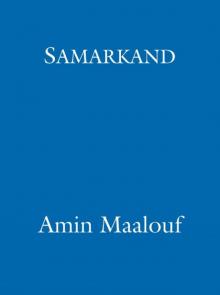 Samarkand
Samarkand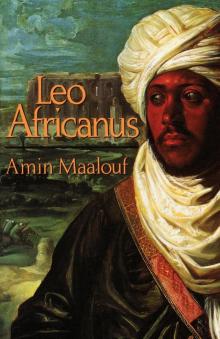 Leo Africanus
Leo Africanus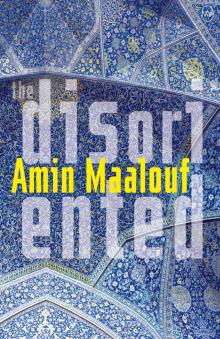 The Disoriented
The Disoriented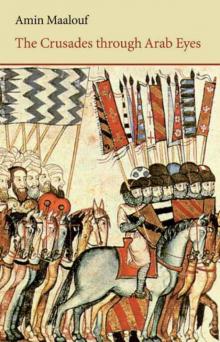 The Crusades Through Arab Eyes
The Crusades Through Arab Eyes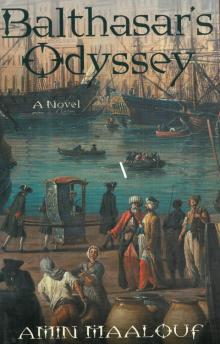 Balthasar's Odyssey
Balthasar's Odyssey